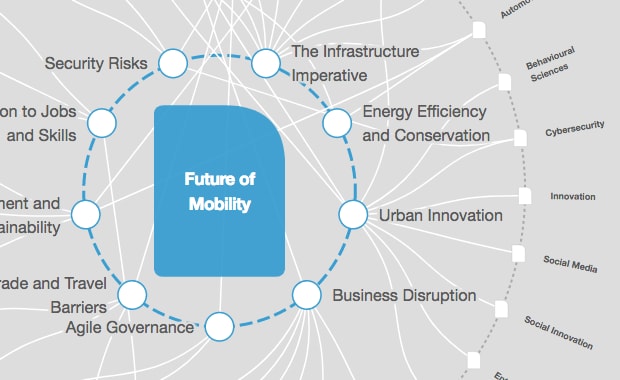The mobility sector's green transition has been slow – here’s how we speed things up
The mobility sector is lagging behind others on reducing carbon emissions
Image: Whee!

Explore and monitor how Mobility is affecting economies, industries and global issues
Stay up to date:
Mobility
- Transport is lagging behind other sectors in reducing their carbon emissions, which will increase the relative share of total emissions in the future.
- The current mobility system, structured around strict public procurement, legacy infrastructure, and traditional regulation and policy, does not aid transformation.
- Policy changes must be implemented to integrate startups into the transportation ecosystem and drive decarbonization.
Transportation comprises 25% of global greenhouse gas emissions, posing a significant obstacle in meeting the decarbonization goals of the Paris Agreement.
Compared to other industries, the transport sector is not making strides in reducing its emissions, which will result in an increasing relative share of total emissions in the years to come.
Transport and mobility are central to economic growth, productivity and urban development and their significance extends beyond emissions.
The current mobility system, structured around strict public procurement, legacy infrastructure, traditional regulation and policy, as well as incumbents with little incentive to change, is not conducive to transformation.
A paradigm shift is needed to meet challenges in climate goals and population growth. But how can goals be met in time without the right system in place? The answer may be found in the startup ecosystem, which, with minimal legacy, is rapidly pushing for new solutions and new models.
Challenges facing mobility
Mobility is not solely determined by a single factor; it emerges as a consequence of multiple interconnected elements. Capital, regulation, urban integration, operations, technology and human behaviour all shape how we move.
How we perceive and address challenges in this field is diverse and often involves a meeting point between innovations and tried-and-true systems. The following three examples show how these complexities could manifest:
- Physical integration: Infrastructure is built to last, but the challenge for new solutions, vehicles and business models is that they must operate in an environment typically optimized for the past.
- Traditional policy and regulation: New mobility companies often represent new ideas that challenge the status quo, which can feel like pushing a square peg into a round hole.
- Public procurement: Typically, a tender exercise involves a lengthy and bureaucratic process with traditional selection criteria, which creates favourable circumstances for incumbent solutions rather than pioneering companies.
The role of mobility startups
Beta Mobility, which partners with cities and startups to accelerate mobility transformation, sought to understand the impact that startups could have in transforming the mobility and transport sector if we assume that startups will be critical for driving technological advancements and new business model innovations.
To investigate this further, we mapped the mobility startups founded in Nordic countries over the past decade. The current landscape consists of over 600 startups, all within the mobility sector.
We found several common factors among the companies we mapped:
- Less legacy: Unlike established companies, startups aren't weighed down by legacy fleets, infrastructure, contracts, or outdated technology, enabling innovation and experimentation without previous commitments or investments.
- Tech-driven: Mobility startups often implement technological innovation first – electrification and autonomous vehicles are prime examples.
- Unique selling points: New startups may prioritize differently from traditional companies, such as with circularity or user experience, which can lead to new business dynamics and improved adoption.
- Fresh takes: Startup founders often see the world differently and don’t fear challenging the status quo, leading to fresh thinking in a conservative sector.
- Variety: Startups create various vehicle form factors, tailoring their offerings to different trips and transportation needs, leading to a diverse sector.
- A shift in ownership: Startups have been key in driving a shift from vehicle ownership to shared vehicles and on-demand services, as they focus on how vehicles are used rather than how many are sold.
The startups driving change
Reshaping procurement in mobility
Candela makes electric foil ferries, representing significant advancements in energy efficiency and passenger comfort. It is now targeting the public transport segment.
While ports are still necessary, without a road network, new routes can be introduced based on travellers’ actual needs, representing an efficient and sustainable transport mode for the masses with low infrastructure requirements.
Candela also experienced public procurement challenges, but it took a gamble and started by building energy-efficient boats for the leisure market. Recognizing the technology’s potential, they made an additional bet on targeting electric foil ferries for commuters and are undergoing a pilot in Stockholm.
If successful, it could reshape procurement criteria. As the Swedish company built this energy-efficient technology from scratch, it holds a competitive advantage over incumbents needing to retrofit traditional vessels running on fossil fuels to meet new selection criteria.

Small vehicle alternative
Whee! delivers an all-inclusive electric cargo bike subscription service tailored to the mobility needs of urban families with small children. The bike can accommodate up to four people and is a viable car replacement. It also enables efficient and sustainable travel during a life phase where car dependence has traditionally been high.
Traditional policy focuses on transitioning from private fossil fuel cars to private electric cars, with electric and cargo bikes often overlooked. However, they need only a fraction of the typical road, parking and infrastructure required for cars and are a healthy, climate-friendly solution for livable cities.
Considering most urban car trips are short, the potential that smaller vehicles represent should get more policy attention.
Adapting the infrastructure
Charging an electric vehicle (EV) is complex and involves many stakeholders. Monta seeks to simplify this through its EV charging platform, which serves hardware manufacturers, operators, businesses and EV drivers with one integrated software solution.
The European Union has introduced an internal combustion engine (ICE) ban by 2035 and the United States aims for 50% of new car sales to be EVs by 2030, which places a global ticking timer on the combustion engine.
For these goals to come to fruition, accessible and affordable charging infrastructure must prevail. Monta’s solution reduces the complexity between those who provide energy and those who use it.
Building a layer on top of existing solutions reduces the need to upgrade the physical infrastructure. For Monta, this approach means that urban integration focuses more on leveraging what already exists and less on building from scratch.

Essential tools for mobility transformation
Sustainable transport efforts will only be possible if policies and regulations are aligned to meet mobility goals. Government and regulatory bodies’ roles are essential in creating an environment that encourages innovation and allows for exploring new ideas.
Ultimately, only a collaborative effort – between startups, traditional companies and policymakers – will result in a resilient, efficient, low-carbon transport sector.
Isolated entities will not transform the future of transportation; interconnected value networks and sustainable ecosystems will shape it.
Don't miss any update on this topic
Create a free account and access your personalized content collection with our latest publications and analyses.
License and Republishing
World Economic Forum articles may be republished in accordance with the Creative Commons Attribution-NonCommercial-NoDerivatives 4.0 International Public License, and in accordance with our Terms of Use.
The views expressed in this article are those of the author alone and not the World Economic Forum.
Forum Stories newsletter
Bringing you weekly curated insights and analysis on the global issues that matter.
More on Urban TransformationSee all
Charlotte Edmond and Rebecca Geldard
August 19, 2025
Luis Antonio Ramirez Garcia
August 11, 2025
Michael Fröbel and Stanislas Hillen
August 8, 2025
Jeff Merritt and Vivian Brady-Phillips
July 25, 2025





